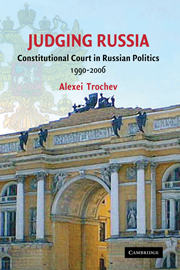Book contents
- Frontmatter
- Contents
- List of Figures and Tables
- Acknowledgments
- Abbreviations
- Notes on Transliteration
- 1 Introduction: Three Puzzles of Postcommunist Judicial Empowerment
- 2 Nonlinear Judicial Empowerment
- 3 Making and Remaking Constitutional Review, Russian-Style
- 4 Russian Constitutional Review in Action (1990–1993)
- 5 Decision Making of the 2nd Russian Constitutional Court: 1995–2006
- 6 The Constitutional Court Has Ruled – What Next?
- 7 The 2nd Russian Constitutional Court (1995–2007): Problematique of Implementation
- 8 “Tinkering with Judicial Tenure” and “Wars of Courts” in Comparative Perspective
- 9 Conclusion: Zigzagging Judicial Power
- Appendix
- Bibliography
- Statutes and Decrees
- Court Decisions
- Index
5 - Decision Making of the 2nd Russian Constitutional Court: 1995–2006
Published online by Cambridge University Press: 25 July 2009
- Frontmatter
- Contents
- List of Figures and Tables
- Acknowledgments
- Abbreviations
- Notes on Transliteration
- 1 Introduction: Three Puzzles of Postcommunist Judicial Empowerment
- 2 Nonlinear Judicial Empowerment
- 3 Making and Remaking Constitutional Review, Russian-Style
- 4 Russian Constitutional Review in Action (1990–1993)
- 5 Decision Making of the 2nd Russian Constitutional Court: 1995–2006
- 6 The Constitutional Court Has Ruled – What Next?
- 7 The 2nd Russian Constitutional Court (1995–2007): Problematique of Implementation
- 8 “Tinkering with Judicial Tenure” and “Wars of Courts” in Comparative Perspective
- 9 Conclusion: Zigzagging Judicial Power
- Appendix
- Bibliography
- Statutes and Decrees
- Court Decisions
- Index
Summary
Like corals, throughout centuries, build coral reefs, so do courts, by applying and reviewing laws against higher legal values, reveal the rich content of constitutional principles.
– Russian Constitutional Court Justice Gadis GadzhievConstitutional Court is not a painter, whose task is to cover the canvas with pre-selected color; it is an artist who must paint a picture on this canvas.
– Russian Constitutional Court Justice Boris EbzeevConstitutional Court has no right to substitute itself for the people who ratified the Constitution … and has no right to rewrite the Constitution at its discretion.
– Russian Constitutional Court Justice Viktor LuchinThis chapter examines the jurisprudence of the 2nd Constitutional Court to see whether political elites succeeded in having the Court comply with their objectives, how they used judicial review, and what the Court did with its broad judicial review powers. The Russian Constitutional Court resumed its work in February 1995, after the Federation Council appointed its last Justice, Marat Baglai. At that time, the Court was in a difficult position: the new 1993 constitution took away certain powers from the Court and expanded the powers of the president; some regions boycotted the tribunal for being too centralist; Yeltsin's supporters blasted the Court for its antipresidential bias in the 1993 constitutional crisis; and Yeltsin's arch rivals hoped to use the reconstituted Court to revenge the president. Moreover, the Court itself was split between the supporters and opponents of the Russian President.
- Type
- Chapter
- Information
- Judging RussiaThe Role of the Constitutional Court in Russian Politics 1990–2006, pp. 118 - 187Publisher: Cambridge University PressPrint publication year: 2008



